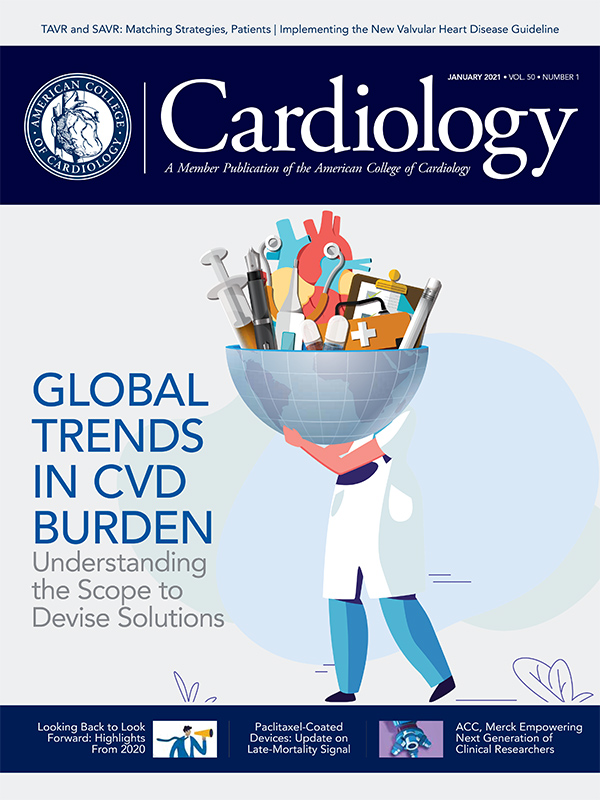New in Clinical Documents | Implementing the New ACC/AHA Guideline on Valvular Heart Disease

An updated Guideline for the Management of Patients With Valvular Heart Disease (VHD) includes expanded treatment options, recommends fewer invasive interventions, when possible, and stresses the importance of patient involvement in treatment considerations.
The new guideline from the ACC and American Heart Association (AHA), and published in the Journal of the American College of Cardiology, replaces the 2014 guideline and a focused update from 2017, and includes an extensive review of available data through March 1, 2020.
Highlighted in the guideline is expansion of indications for transcatheter aortic valve implantation (TAVI) as a result of multiple randomized trials of TAVI vs. surgical aortic valve replacement.
According to the guideline, "the choice of type of intervention for a patient with severe aortic stenosis should be a shared decision-making process that considers the lifetime risks and benefits associated with type of valve (mechanical vs. bioprosthetic) and type of approach (transcatheter vs. surgical)."

In addition, the evidence for non-vitamin K oral anticoagulants (NOACs) has improved since the last guideline was published, and the new guideline includes a class 1 level A recommendation that states: "For patients with AFib and native valve heart disease (except rheumatic mitral stenosis) or who received a bioprosthetic valve >3 months ago, a NOAC is an effective alternative to [vitamin K antagonist] VKA anticoagulation and should be administered on the basis of the patient's CHA2DS2-VASc score."
Other recommendations address the optimal timing of intervention for severe aortic stenosis, which depends on the severity of the valve condition, as well as the safety and long-term effectiveness of treatment options.
The guideline authors note that the recommended timing of interventions will shift to earlier in the disease course for some patients as ongoing clinical research data evolves. Additionally, the guideline recommends that patients with severe VHD and who are being considered for valve repair or replacement should be evaluated by a specialized team working with a primary or comprehensive valve center.
Shared decision-making and the use of less-invasive treatment options are other important aspects of the new guideline.
"Clinical studies have demonstrated the safety and effectiveness of new, less-invasive approaches for treatment of heart valve dysfunction," says Catherine Otto, MD, FACC, co-chair of the guideline writing committee. "Integration of this expanded evidence base, in conjunction with expert clinical experience, will furnish both providers and patients with the guidance needed to ensure optimal outcomes for patients with heart valve conditions."

Looking ahead, the guideline committee recommends more disease-specific studies and patient-centered trials that focus on each stage of the disease process.
"While this guideline focuses on patients with end-stage heart valve disease, future research will also lead to treatments to prevent heart valve disease or earlier interventions to slow its progression," explains Otto.
"There is a knowledge explosion in medicine today, which can overwhelm the clinician," says Rick A. Nishimura, MD, MACC, co-chair of the writing committee. "This is particularly true in the area of VHD, in which multiple investigational trials are being rapidly performed and released, so that it becomes extremely difficult for an individual clinician to keep up with optimal treatments for each specific patient. The Valvular Heart Disease Guideline brings together experts in the field who review all the data and arrive at a consensus opinion for best treatment, outlined in the Class Recommendations."
The guideline was developed in collaboration with and endorsed by the American Association for Thoracic Surgery, the American Society of Echocardiography, the Society for Cardiovascular Angiography and Interventions, the Society of Cardiovascular Anesthesiologists and the Society of Thoracic Surgeons.
Click here for 10 key perspectives on VHD and patients with aortic stenosis (AS), aortic regurgitation (AR), or bicuspid aortic valve (BAV).
Click here for key perspectives on VHD focused on mitral stenosis, mitral regurgitation and tricuspid valve disease.
Click here for key perspective focused on mixed valve disease, prosthetic valves, infective endocarditis (IE), and pregnancy and valvular heart disease.
Clinical Topics: Anticoagulation Management, Arrhythmias and Clinical EP, Cardiac Surgery, Cardiovascular Care Team, Congenital Heart Disease and Pediatric Cardiology, Geriatric Cardiology, Invasive Cardiovascular Angiography and Intervention, Noninvasive Imaging, Valvular Heart Disease, Anticoagulation Management and Atrial Fibrillation, Atrial Fibrillation/Supraventricular Arrhythmias, Aortic Surgery, Cardiac Surgery and Arrhythmias, Cardiac Surgery and CHD and Pediatrics, Cardiac Surgery and VHD, Congenital Heart Disease, CHD and Pediatrics and Arrhythmias, CHD and Pediatrics and Imaging, CHD and Pediatrics and Interventions, CHD and Pediatrics and Prevention, CHD and Pediatrics and Quality Improvement, Interventions and Imaging, Interventions and Structural Heart Disease, Angiography, Echocardiography/Ultrasound, Magnetic Resonance Imaging, Nuclear Imaging
Keywords: ACC Publications, Cardiology Magazine, Aged, 80 and over, Administration, Oral, American Heart Association, Anticoagulants, Angiography, Aorta, Aortic Coarctation, Aortic Valve, Aortic Valve Insufficiency, Aortic Valve Stenosis, Atrial Fibrillation, Bioprosthesis, Blood Pressure, Cardiology, Consensus, Decision Making, Dilatation, Dissection, Echocardiography, Exercise Test, Exercise Tolerance, Feasibility Studies, Heart Valve Diseases, Life Expectancy, Magnetic Resonance Angiography, Mitral Valve Stenosis, Natriuretic Peptide, Brain, Palliative Care, Patient Participation, Patient-Centered Care, Pulmonary Circulation, Quality of Life, Referral and Consultation, Risk Assessment, Risk Factors, Surgeons, Stroke Volume, Thoracic Surgery, Transcatheter Aortic Valve Replacement, Ventricular Function, Left, Vitamin K, Writing
< Back to Listings


